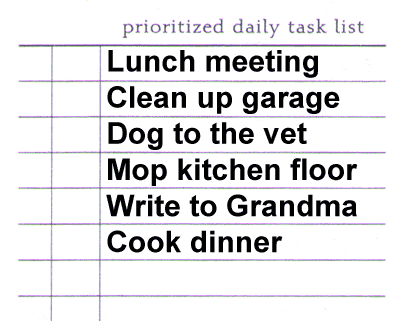EDTEC 671: Learning Environment Design
Download: (63kb Word .doc)
Introduction Slide
In a prior lesson you learned
-
where to find tasks for your daily task list,
-
some best practices for compiling your list,
-
and how to leave space for Priority and Order columns down the left side of your list.
Now we'll learn about how to prioritize a task list.
Importance Slide
Not all tasks are created equal. Some are more importand than others. If you concentrate on lesser priority tasks, those really important ones might not get done well, or at all. Fortunately there is a really simple process for getting the most out of your task list.
Lesson Overview & Objectives Slide
This lesson will teach you Task Prioritization terminology, and a process to use while Prioritizing your own tasks. You will learn
- The definition and relationship between Vital, Important, and Optional daily tasks,
- How to properly label tasks on a daily task list
Order of Topics Slide
(may not include this one in final lesson)
This lesson contains the following topics:
- How to know if a task is Vital
- How to know if a task is Important
- How to know if a task is Optional
- How to label a Vital task
- How to label an Important task
- How to label an Optional task
Activate prior knowledge
In the last lesson you learned how to compile a list of tasks during your daily planning session. You probably have a list that looks very much like this one:

Notice that you've listed your tasks in any order, and that there are two columns on the left side, one for Priority, another for Order. This is a really well-constructed Daily Task List!
Some of these tasks are clearly more important than others. So how do you tell them apart? Lets move on and talk about the most important tasks.
Vital Tasks
The most important tasks in a daily task list are (you guessed it): tasks that MUST be completed TODAY. If you don't do them today, there will be significant, negative consequences.
Here's an example. Suppose you're leaving today on vacation, and one of your tasks is "Take dog to kennel". If you don't complete that task, the dog will tear up your house while you're away. You MUST take your dog to the kennel, and you MUST do it today.
This type of task is known as a Vital Task. There are many things that make a task vital. For instance, suppose you have check to deposit, and you know the bank is closed on Sunday. Since you MUST deposit that check before Sunday, it's a Vital task on Saturday's task list.
Continuing with the check example, suppose today is Thursday? Let's go to the next section to talk about moderately important tasks.
Important Tasks
Clearly, you need to get that check to the bank. But on Thursday, it's not something you must do, just something you SHOULD do. Tasks that you SHOULD do today are known as Important Tasks.
Here's another example. A friend called yesterday and left you a friendly message. You know you SHOULD call your friend back, but you have a lot of Vital Tasks today. Your friend will understand if it takes a day or two to call her back. Calling your friend is an Important Task, but nothing serious will happen if it doesn't get done today.
(Certainly, if your friend called saying they were trapped inside their car by a polar bear, calling your friend might become a Vital Task. But unless we tell you otherwise, don't read too much into a certain scenario).
What about activities that generate a task, but aren't so important that they MUST or SHOULD be done today? Go to the next section!
Optional Tasks
Some activities can generate tasks, but really aren't immediately important. Generally these tasks involve maintenance or "nice to do" activities, such as cleaning out your storage unit. You'll have to get it done eventually, but there's no penalty today, and it's really not that important on a daily basis.
Tasks that you COULD do today are known as Optional Tasks. If you don't get it done today, this week, or even this month, there will be no real consequence.
Now that you've been introduced to the three Priority levels for tasks, let's do a little practice identifying tasks.
Practice #1
Scenario: You're leaving today on a business trip where you'll meet your boss at a convention. Which of these tasks are Vital Tasks?
- Painting the house
- Packing for today's business trip
- Backing up your hard drive
- Returning a phonecall from your boss
If you picked #2 and #4, you are absolutely correct! Since you're leaving today on business, you MUST pack today. Similarly, you MUST call your boss, or risk the immediate consequence of losing your job. You certainly SHOULD back up your hard drive before the trip, but while it's Important, the consequences are negligible. You COULD stant painting the house today, but it's really Optional.
Let's try another scenario.
Practice #2
Scenario: Your child is having a band recital tonight. Which of these tasks are Important Tasks?
- Pick up band instrument from repair shop
- Reserve a hotel for next week's vacation
- Change burnt-out bulb in refridgerator
- Reorganize the refridgerator
If you picked #2 and #3 you clearly understand the difference between Vital, Important, and Optional Tasks. You have plenty of time to reserve a hotel and replace that lightbulb, and those tasks really SHOULD be done. Picking up the band instrument is VITAL for tonight's concert, and reorganizing the 'fridge would be nice, and COULD be done if there were no other tasks to complete.